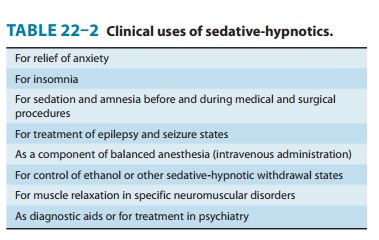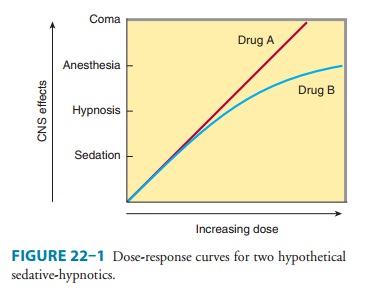Chapter: Basic & Clinical Pharmacology : Sedative-Hypnotic Drugs
Treatment of Anxiety States
CLINICAL PHARMACOLOGY OF SEDATIVE
HYPNOTICS
TREATMENT OF ANXIETY STATES
The
psychological, behavioral, and physiological responses that characterize
anxiety can take many forms. Typically, the psychic awareness of anxiety is
accompanied by enhanced vigilance, motor tension, and autonomic hyperactivity.
Anxiety is often secondary to organic disease states—acute myocardial
infarction, angina pectoris, gastrointestinal ulcers, etc—which themselves
require specific therapy. Another class of secondary anxiety states
(situa-tional anxiety) results from circumstances that may have to be dealt
with only once or a few times, including anticipation of frightening medical or
dental procedures and family illness or other stressful event. Even though
situational anxiety tends to be self-limiting, the short-term use of
sedative-hypnotics may be appropriate for the treatment of this and certain
disease-associated anxiety states. Similarly, the use of a sedative-hypnotic as
pre-medication prior to surgery or some unpleasant medical procedure is
rational and proper (Table 22–2).

Excessive
or unreasonable anxiety about life circumstances (generalized anxiety disorder,
GAD), panic disorders, and agora-phobia are also amenable to drug therapy,
sometimes in conjunc-tion with psychotherapy. The benzodiazepines continue to
be used for the management of acute anxiety states and for rapid control of
panic attacks. They are also used, though much less commonly than in the past,
in the long-term management of GAD and panic disorders. Anxiety symptoms may be
relieved by many benzodiaz-epines, but it is not always easy to demonstrate the
superiority of one drug over another. Alprazolam has been used in the treatment
of panic disorders and agoraphobia and appears to be more selec-tive in these
conditions than other benzodiazepines. The choice of benzodiazepines for the
treatment of anxiety is based on several sound pharmacologic principles: (1) a
rapid onset of action; (2) a relatively high therapeutic index (see drug B in
Figure 22–1), plus availability of flumazenil for treatment of overdose; (3) a
low risk of drug interactions based on liver enzyme induction; and (4) minimal
effects on cardiovascular or autonomic functions.

Disadvantages
of the benzodiazepines include the risk of dependence, depression of central
nervous system functions, and amnestic effects. In addition, the
benzodiazepines exert additive central nervous system depression when
administered with other drugs, including ethanol. The patient should be warned
of this possibility to avoid impairment of performance of any task requir-ing
mental alertness and motor coordination. In the treatment of generalized
anxiety disorders and certain phobias, newer antide-pressants, including
selective serotonin reuptake inhibitors (SSRIs) and serotonin-norepinephrine
reuptake inhibitors (SNRIs), are now considered by many authorities to be drugs
of first choice . However, these agents have a slow onset of action and thus,
limited effectiveness in acute anxiety states.
Sedative-hypnotics
should be used with appropriate caution so as to minimize adverse effects. A
dose should be prescribed that does not impair mentation or motor functions
during waking hours. Some patients may tolerate the drug better if most of the
daily dose is given at bedtime, with smaller doses during the day.
Prescriptions should be written for short periods, since there is little
justification for long-term therapy (defined as use of thera-peutic doses for 2
months or longer). The physician should make an effort to assess the efficacy
of therapy from the patient’s subjec-tive responses. Combinations of
antianxiety agents should be avoided, and people taking sedatives should be
cautioned about the consumption of alcohol and the concurrent use of
over-the-counter medications containing antihistaminic or anticholinergic drugs.
Related Topics